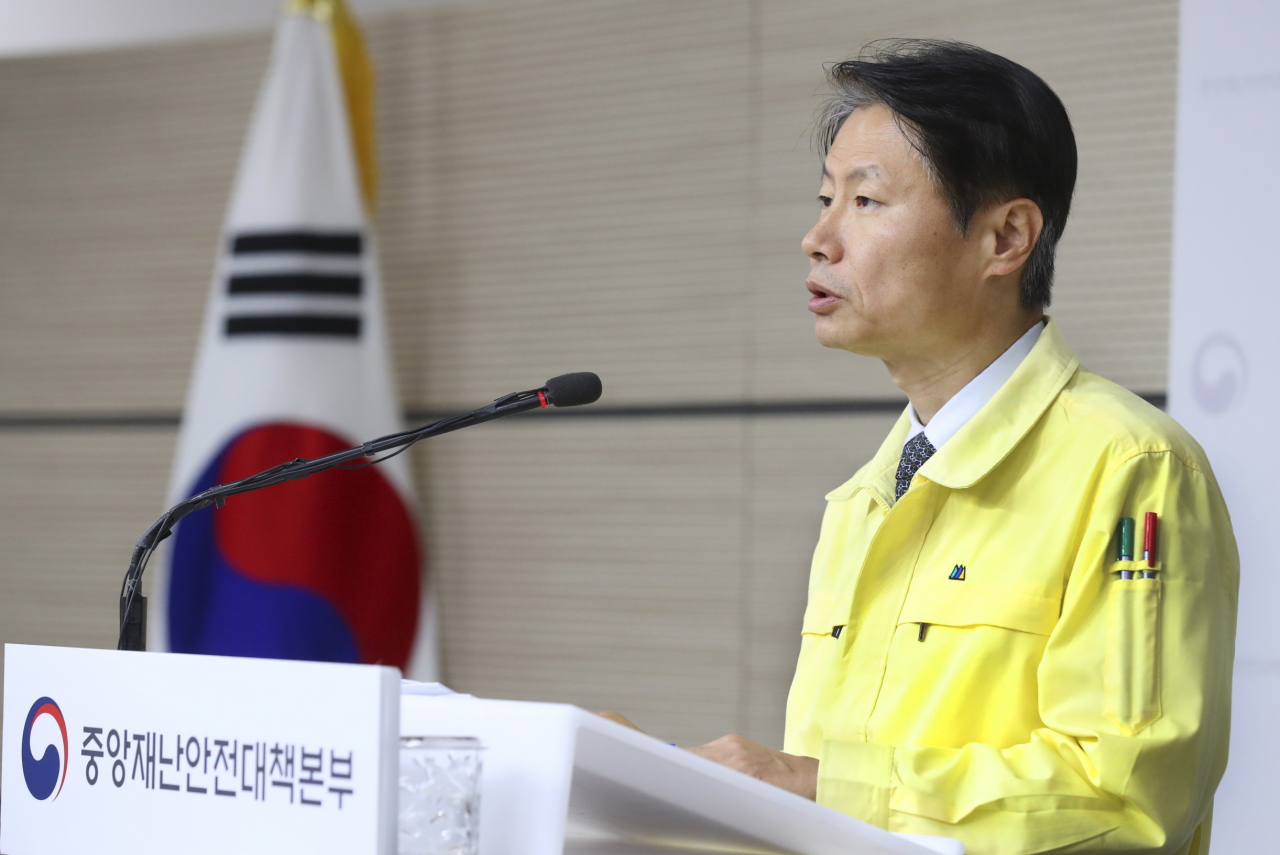Korea sticks to honor system in virus battle
Vice health minister ‘sorry’ for no improvement on virus
By Kim ArinPublished : March 31, 2020 - 15:57

South Korea’s virus fight plan will largely remain noncompulsory, Vice Health Minister Kim Gang-lip said Tuesday, with its surveillance system upheld by massive testing and contact tracing.
Korea on Tuesday added 125 to its virus tally with the total now reaching 9,786. Over half -- 5,408 -- have recovered so far. Five more people died, bringing the death toll to 163.
Of the two-week “intense” social distancing campaign that kicked off March 22, Kim said the ministry was “sorry” for the lack of a visible fall in new infections.
The campaign, announced March 21 by Prime Minister Chung Sye-kyun, encouraged voluntary compliacne from the public in distancing without imposing lockdowns or restrictions on movements.
On instances of safety infractions such as the breach of quarantine orders, Kim said the ministry will speak with the Korea Centers for Disease Control and Prevention to review legal grounds for taking extra action.
“Doing our part to keep communities safe even in absence of regulations is a responsibility as members of the society. Small actions such as avoiding outings when feeling unwell can arm us in combating the global crisis,” said the vice minister.
“Failures to comply with the steps mean the longer we will have to practice distancing.”
Last week, the government said it would begin to draw up a timeline for a gradual return to normal in an eased-up social distancing strategy known as “everyday distancing.”
The concept is to enable a partial resumption of previrus routine to soften the blow on the economy while quelling the spread with practical safety regulations.
But this is only on the condition that the curve not only flattens, but declines substantially for an extended period of time.
The main fight in Korea’s virus war is now at its borders, where about 300 to 350 tests are being conducted each day to catch incoming infections.
Symptomatic individuals coming in from the United States have been subject to testing at the airport since Friday, and those from Europe since March 24. The airport has set up facilities with 363 rooms to accommodate symptomatic travelers while they wait for results.
The Health Ministry’s scheme of testing all flights from Europe regardless of symptoms was modified two days after being implemented March 22 due to overwhelming demand.
Korea has also been thermally screening departing passengers from March 5 to prevent passing on the disease overseas. Anyone with a body temperature above 37.5 Celsius degrees is barred from leaving.
Despite calls from the medical community to limit nonessential inbound travel to reduce the burden on the health system here, the government is firm on keeping its borders open.
About 7,000 people are coming into Korea a day, according to government data, which amounts to approximately 100,000 coming in every two weeks.
On Monday, 28.5 percent of arrivals -- 2,082 out of 7,282 people -- to Korea were foreign nationals.
“Allowing cross-border exchanges is intended to safeguard principles of the common good and to invigorate the economy,” Health Minister Park Neung-hoo said over the weekend. Instead, amplified isolation measures to come into effect shortly will help detect infections.
Starting Wednesday, everyone arriving here will be required to self-quarantine for two weeks. So far, the mandatory isolation has been applicable only to those from the US and Europe.
Foreigners who are without a place to stay for the isolation period will be housed at state-arranged accommodations attended by medical personnel and support staffers.
Failing to abide by the quarantine can result in a penalty of up to 1 year in jail and a fine of 10 million won ($8,200), according to laws on infectious disease control.
Of 29 imported cases confirmed Monday, 15 were caught at the airport and 14 after they entered the country.
Resurgent local transmissions center on communal activities.
Kwon Jun-wook, vice director of the KCDC, said Tuesday that 83.8 percent of the total 9,786 virus patients were linked to cluster cases.
Three after-school tutoring services in Seoul’s Dobong, Mapo and Gangnam districts suspended operations after teachers there tested positive. The city office has instructed some 253 students and others who came into contact with the infected teachers to self-isolate.
In-person services continue to put churchgoers at risk.
Thirty-three were recently diagnosed at a Christian church in Seoul’s southern Guro district. Earlier this month, 46 were infected en masse at another church in Gyeonggi Province after forgoing physical distancing recommendations.
Hospitals and nursing homes populated by at-risk groups are experiencing bursts of infections.
At least seven at a hospital in Uijeongbu, Gyeonggi Province, have been confirmed with the virus, with 202 medical staff and patients still undergoing testing.
A mental health hospital in Daegu saw 133 of its staffers and inpatients infected as of Monday, according to city officials.
The KCDC thanked and applauded health care providers for their commitment and sacrifice in the coronavirus response.
“The Centers is deeply indebted to health care workers who are risking their own health on the front line,” Kwon said. “They are to be commended for success thus far in large-scale containment efforts.”
By Kim Arin (arin@heraldcorp.com)







![[KH Explains] How should Korea adjust its trade defenses against Chinese EVs?](http://res.heraldm.com/phpwas/restmb_idxmake.php?idx=644&simg=/content/image/2024/04/15/20240415050562_0.jpg&u=20240415144419)











![[Today’s K-pop] Stray Kids to return soon: report](http://res.heraldm.com/phpwas/restmb_idxmake.php?idx=642&simg=/content/image/2024/04/16/20240416050713_0.jpg&u=)